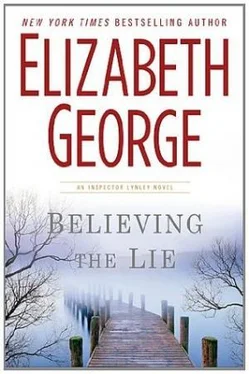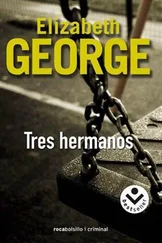“Ah,” Lynley said.
Fairclough smiled. “The Fairloo,” he said as means of clarification.
That did it, of course, as it would do. Bernard Fairclough had come to prominence first because of a most unusual lavatory invented and then widely produced by Fairclough Industries. He’d sealed his place in the firmament of those receiving titles from a grateful nation, however, by establishing a charitable foundation whose focus was raising funds to research a cure for pancreatic cancer. However, Fairclough had never been able to escape his association with the lavatory, and much amusement had been generated by tabloids referring to his knighthood and subsequent elevation to the peerage with such declarations as “It was a royal flush.”
Hillier gestured at the table. Lynley was meant to join them. Without asking, Hillier poured him a cup of coffee and, as Lynley sat and Fairclough resumed his own place at the table, slid the cup in his direction along with the milk and sugar.
“Bernard’s asked a favour of us,” Hillier said. “It’s an entirely confidential matter.”
Which explained their meeting at Twins, Lynley thought. Which also explained their meeting at Twins at a time of day when the only members in the building were probably either dozing over newspapers in the library or playing squash in a basement gym. Lynley nodded but said nothing. He glanced at Fairclough, who removed a white handkerchief from his pocket and patted it against his forehead. This bore a moderate sheen of sweat. It was not overly warm in the room.
He said, “My nephew — Ian Cresswell, my late sister’s son — drowned ten days ago. South end of Lake Windermere sometime after seven in the evening. His body wasn’t found till the next afternoon. My wife was the one who found him.”
“I’m sorry to hear it.” It was, of course, an automatic response to being given such information. Hearing it, Fairclough’s face remained a blank.
“Valerie likes to fish,” he told Lynley, a remark that sounded apropos of nothing till he went on with, “She takes a small rowingboat out a few times each week. Odd hobby for a woman but there it is. She’s fished for years. We keep the boat along with several other craft in a boathouse on the property, and that’s where Ian’s body was. Facedown in the water, open gash on his head, although at that point there was no blood.”
“What seems to have happened?”
“Lost his footing getting out of a single scull. It’s how he took his exercise, that, the scull. He went down, hit his head on the dock — it’s stone — and fell into the water.”
“Couldn’t swim or unconscious?”
“The latter. A terrible accident, according to the inquest.”
“You think otherwise?”
Fairclough turned in his seat. He seemed to look at a painting over a fireplace at the far side of the room. This was a circus scene painted in the style of Hogarth: part of the rake’s progress, with assorted human oddities from the circus in place of the rake. It was another vote for the conjoined twins. They’d have been circus material, certainly. Fairclough studied the scene depicted before he finally said, “He fell because two large stones came loose on the dock. They dislodged.”
“I see.”
Hillier said, “Bernard thinks there’s a chance the stones had some help, Tommy. The boathouse has stood for more than one hundred years and it was built to stand a hundred more. So was the dock.”
“Yet if the coroner has ruled an accident — ”
“I don’t actually disbelieve him,” Fairclough said quickly. “But …” He looked at Hillier as if asking the AC to finish.
Hillier complied. “Bernard wants to be certain it was an accident, as anyone might. There are family concerns.”
“What sort of family concerns?”
The other men were silent. Lynley looked from one to the other. He said, “I can hardly make certain of anything if I’m in the dark, Lord Fairclough.”
“It’s Bernard,” Fairclough said, although Hillier’s look in his direction suggested that such familiarity was going to breed the usual. “It’s Bernie, actually, among the family. But Bernard will do.” Fairclough reached for his coffee cup. Hillier had topped it up, but it seemed that Fairclough wanted the cup more for something to do with his hands than for drinking. He turned it, examined it, and finally said, “I want to be certain that my son Nicholas wasn’t involved in Ian’s death.”
Lynley let a moment hang while he absorbed this information and what it could imply about the father, the son, and the deceased nephew. He said, “Have you reason to believe Nicholas might be involved?”
“No.”
“Then?”
Again that glance towards Hillier, which prompted the AC to say, “Nicholas has had a… We’d have to call it a troubled youth. He seems to have got over it, but as he’s seemed to get over it before, Bernard’s fear is that the boy — ”
“A man now,” Fairclough cut in. “He’s thirty-two. He’s married as well. When I look at him, things seem to have changed. He seems to have changed, but it was drugs, all sorts but particularly methamphetamine, and it went on for years, you see, since he was round thirteen. He’s lucky even to be alive at this point, and he swears he knows it. But that’s what he always said, isn’t it, time after time.”
Lynley heard all this with a dawning of understanding as to how he fitted into what was going on. He’d never spoken of his brother to Hillier, but Hillier had snouts in every part of the Met and how unlikely was it that among the information he gathered was that which told the AC of Peter Lynley’s battles with addiction?
Bernard continued. “Then he met a woman from Argentina. She’s a real beauty, and he fell in love, but she laid down the law. She’d have nothing to do with him till he got the monkey off his back permanently. So he did so. Apparently.”
To Lynley this seemed all the more reason that Nicholas Fairclough was uninvolved, but he waited for more and it came in fits and starts. It seemed that the dead man had grown up in the Fairclough home, playing the role of an older brother whose perfection had created footsteps too large for the younger Nicholas ever to hope he’d be able to walk in. Ian Cresswell had successfully completed schooling at St. Bees in Cumbria, and from there achieved further success at university. This put him in position to serve as the chief of finances for Fairclough Industries as well as the man in charge of Bernard Fairclough’s personal financial affairs. These affairs, it seemed, were considerable.
“No decision’s been made as to who’ll take over the daily running of the firm when I’m no longer around,” Fairclough said. “But obviously, Ian was very high on the list of contenders.”
“Did Nicholas know this?”
“Everyone knew it.”
“Does he stand to gain, then, from Ian’s death?”
“As I’ve said, no decision had — or has — been made.”
So if everyone knew where Ian stood, everyone — whoever everyone was — had a motive for murder, Lynley thought, if murder it was. Yet if the coroner had deemed it an accident, Fairclough should have been relieved, which he clearly was not. Lynley wondered idly if, despite his words, Fairclough in fact wanted his son to be the cause of his own cousin’s death. It was perverse, but in his time at the Met, Lynley had seen his share of perversity.
“Exactly who is everyone?” Lynley enquired. “I take it there are others besides Nicholas with a vested interest in Fairclough Industries?”
There were, as it turned out: There were two older sisters and a former son-in-law, but it was Nicholas about whom Fairclough had concerns. Lynley could leave the rest of them alone. Not a single one of them was a killer. They lacked the bottle for it. Nicholas, it seemed, did not. And besides, with his history… One wished to be sure he had no involvement in this matter. One merely wished to be sure.
Читать дальше












